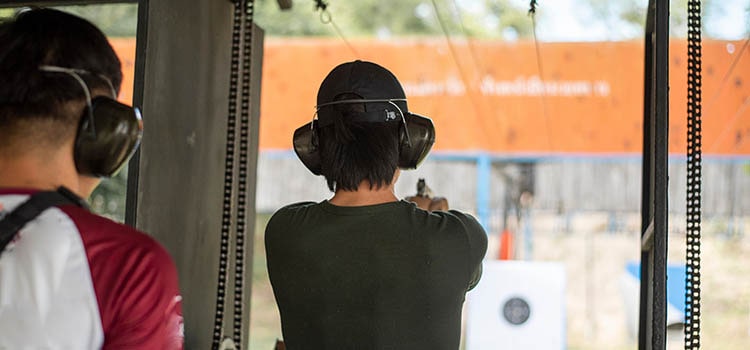In this article
How to become a bailiff

If your exposure to bailiffs is limited to what you’ve seen on TV, you might be under the impression that bailiffs simply bring in the accused and stand beside judges. In fact, bailiffs play an integral role in the criminal justice and legal system.
What is a bailiff and what do they do?
Bailiffs, sometimes called courtroom deputies, provide courtrooms and those in them with security and stability. While their specific duties can vary from one jurisdiction to the next, they’re often responsible for:
- Ensuring people are not armed as they enter the courtroom and confiscating any unauthorized weapons
- Declaring the judge’s entry into the courtroom
- Keeping order during the trial
- Announcing and enforcing courtroom rules
- Escorting prisoners to and from court
- Handling evidence
- Ensuring judges have all necessary files and supplies
A critical responsibility for bailiffs is jury oversight. This requires a bailiff to oversee a collection of jurors, their movements and their communication patterns in order to ensure integrity and discretion within a trial. When a jury is sequestered in a hotel, the bailiff is responsible for securing that hotel. They accompany the jurors to restaurants or other areas, ensuring the jurors do not contact other people. During jury deliberation a bailiff may be responsible for sustaining a safe juror environment, as well as performing certain transactional duties once a sentence has been agreed upon.
Ensuring that jurors abide by the confinements of a trial’s boundaries helps maintain the integrity of an ongoing trial. Jury oversight and management ensures no jurors violate the courts requirements or negatively impact the outcome of a case.
Furthermore, proper training and courtroom experience can greatly impact the ability of a courtroom deputy to maintain composure in the courtroom during litigation and sentencing.
“Of great importance, a courtroom deputy must be well trained. [Bailiffs] must be prepared to defuse any situation before it gets out of control. One situation that comes to mind from several years ago, involves lawyers whose argument fairly quickly escalated from referring to one another as ‘disingenuous’, to referring to each other as liars and pretty quickly gloves came off and a fist fight started. Luckily, my well-trained deputy got between them before anything serious happened, broke them up and sent them to their neutral corners,” said Sol Casseb, a judge working in San Antonio, Texas.
Steps to become a bailiff
Meet the basic prerequisites.

When pursuing your career as a bailiff, identify the bare-bones requirements established in your jurisdiction. Basic prerequisites in the U.S. include:
• Be 21 years of age (18 for certain jurisdictions/positions)
• Earning a high school diploma or GED
• Pass a background screening
• Pass a drug screening
• Pass the required physical standards/tests
Many states require bailiffs to receive their law enforcement certification. This certification is generally given to those who graduate from a state-licensed police academy. However, certain states do not require bailiff candidates to attend a police academy.
Research your jurisdictions requirements and confirm whether or not you need to attend a police academy or earn any additional certifications. Generally, you can find specific requirements from your local sheriff’s department.
Consider earning a higher degree.

Whether or not your area requires a degree, many candidates can benefit from earning one. Earning your degree in a related major, such as criminal justice, can help you stand out to law enforcement employers and could lead to higher earning potential. Other applicable fields of study, such as political science, are often sought out by law enforcement agents and future bailiffs.
A degree can allow candidates to enter other fields of law enforcement before or after becoming a bailiff. If you’re interested in pursuing different aspects of law or law enforcement, seeking higher education could help you meet the various requirements for those positions.
Complete the required field training and gain experience.

Certain states and court systems require potential bailiffs to complete field training. You can check the specifics (and required length of potential field training) through the law enforcement agency responsible for placing bailiffs. Most agencies clearly list the required number of training hours on their website or within job listings.
Many newly employed bailiffs may be hired on as a “trainee bailiff.” A trainee bailiff undergoes further field training before being promoted to bailiff. The length of this training period varies in each jurisdiction.
Additionally, many law enforcement agencies seek candidates with previous experience in policing, corrections and courtroom administration. So, those looking to enter this career should consider building experience in law enforcement more generally before seeking a bailiff role.
Common educational paths
Many law enforcement agencies require just a high school diploma or GED to become a bailiff. However, some agencies prefer candidates who have an associate or bachelor’s degree. An applicable major such as criminal justice, political science or various law enforcement majors may help you streamline the process of landing a bailiff job.
A criminal justice degree showcases to future employers that candidates have gained a substantial educational foundation in law enforcement. The degree plan for criminal justice majors requires students to study and master topics such as general crime statistics, law enforcement protocol, adjudication and corrections laws. Most bachelor’s degrees majoring in criminal justice require at least 120 credit hours, which most full-time candidates can complete within four years.
Learn outside the box
A specialized focus in other fields of study may benefit you if are thinking beyond a career as a bailiff as well.
For example, with growing public usage of the internet and digital media, you may choose to study cybersecurity or even internet law. Earning your degree in cybersecurity or a similar modern field can help those looking to become a bailiff stand out to potential employers, as well as set you up for a future career.
Studying a major like forensic psychology can also be ideal for candidates who wish to become a bailiff, as this degree focuses on both psychology and law. It also involves a valuable mix of different forensic science skills in addition to a strong base of psychological knowledge. This balance can be excellent for bailiffs, who require useful skills like de-escalation techniques and an understand of the human psyche.
With the wide choice of potential majors available for a bailiff, it is important to pick the educational path that suits your needs best.
Median annual bailiff salary
Employment for bailiffs and correctional officers is expected to decline by -2.3% through 2032. According to the BLS, budget constraints and a predicted downward trend in crime rates will contribute to the drop in employment.
Common job benefits
Law enforcement agencies are generally notable for the health insurance benefits and retirement programs it offers its agents. Most bailiff jobs come with a set of benefits which may include health insurance, life insurance, and a pension plan with progressive incentive programs. It is important to check with your recruiter about job benefits before accepting a bailiff position. Most hiring agencies list these benefits during the interview process.
Career pathways to bailiff
Many law enforcement agents pursue a bailiff career after spending time in other areas of law or law enforcement. Some officers start out as a bailiff, then pursue other law enforcement careers with more hands-on daily duties. Some examples include:
- Police officer
- Parole/probation officer
- Corrections officer
- Prison warden/prison guard
- Social worker
- Court clerk
Many bailiffs may find that their experience and skills transfer easily to the associated careers listed above, and the experience they gained in the courtroom, could help them shine during the application process for other careers.
Bailiff career FAQs
What are the responsibilities of a bailiff?
Bailiffs are responsible for signaling and notifying the judge when court is ready to proceed and for enforcement simple instructions and standards within the courtroom. In certain extreme cases, if a defendant tries to escape the courtroom, bailiffs are responsible for apprehending them.
What qualities make for a successful bailiff?
A variety of different personal qualities add to the ability to maintain the composure of a courtroom and those within it.
“A court room deputy should have, among other things, a good personality such that he or she can dialogue with the attorneys, the jurors and other courthouse personnel. Additionally, and obviously, he or she must have a good work ethic. That is, they must appear for work on time, tend to the needs of the jurors and make sure that attorneys are comfortable, handle themselves appropriately, do not approach the judge unless requested,” Casseb said.
What does the weekly schedule look like for most bailiffs?
Generally, most bailiffs are expected to work the traditional 40 hour week, between nine to five. However, many court systems require bailiffs to work conditional overtime or odd hours to accommodate court dockets. These hours vary due to the different demands or hours of a court system.
What states employ the most bailiffs?
According to the BLS, the top five states that employ bailiffs are:
1. New York
2. Ohio
3. Massachusetts
4. Florida
5. Michigan


